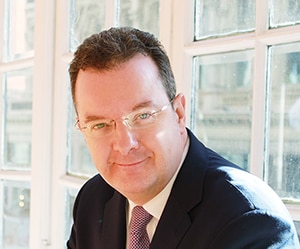Kieran Donoghue, head of international financial services, strategy and public policy for Ireland’s Investment Development Agency, talks with Global Finance about how FDI is changing and new global trends shaped by Brexit.
Global Finance: Few observers are closer to Brexit than you are. How do you see it changing global trade and finance?

Kieran Donoghue: Multinationalists have said that Brexit is such a seismic event—it isn’t a reason to just respond tactically in terms of preserving Euromarket access; it’s a reason to be open to changing their business. Many groups now are moving from a three-market model to a four-market model, where they’re carving out the UK and creating a separate market. Moving to a four-market model is a significant strategic decision by a lot of multinationals.
We see the restructuring of an industry from having been traditionally anchored by a major hub in London to something more distributed as a long-term trend. Post-financial crisis, the pressure is on institutions to reconfigure themselves in response to what they learned, to optimize their risk management more effectively. The European financial-services industry that was anchored around a hub in London is now becoming distributed and decentralized. They’re not abandoning London. They will retain a substantial presence in London forever; they’re just carving out the EU.
GF: How is it changing Ireland’s economic ecosystem?
Donoghue: [Ireland] made a public-policy decision in 1987 to establish an International Financial Services Center in Dublin, known as the IFSC. At the time, the type of activities that financial-services firms were most likely to establish in Ireland were back- and middle-office activities, because we didn’t have a history of doing complex financial services, if we had pitched for regulated activities in the 1980s, we wouldn’t have been viewed as credible. The banks would have said, “You’re a small, open economy on the edge of Europe. You don’t offer a domestic market.” Going after that middle office made sense.
Now, there is much more complex financial activity taking place in Ireland than people imagine, such as security, margin financing, investment banking and broker-dealer activity. What we do currently with multinationals is identify low-hanging fruit, embed the activity into our jurisdiction, then work closely with local management and corporate headquarters to evolve the business over time.
Where they elect to go after Brexit, is driven by where their customers would like them to locate, and by deciding what type of expertise, infrastructure and other requirements they need to run their EU business in a post-Brexit climate. That’s what has drawn them to [Ireland]—or Frankfurt, Paris, Amsterdam—you have some outliers that go to Brussels or maybe Madrid; because when it boils down to it, there’s politics around this.
GF: What are your priorities—besides financial services?
Donoghue: A lot of companies are internationalizing very early in their life cycle. They don’t necessarily stay in their home market and become giants and then decide to internationalize. So these are much smaller multinationals than what we were traditionally used to; they have a very broad portfolio. We view ourselves as having a duty of caring for those, so we look after those clients and we target those sectors to get the existing clients to reinvest every year.
GF: Why the impasse? What do you see happening in March?
Donoghue: EU skepticism comes down to moral-hazard issues. The UK decided to leave; so while we all want to negotiate the best possible deal, it can’t be a deal that incentivizes a slow breakup with the European Union. It’s about finding a balance. In March next year, when the United Kingdom does leave the EU, we view that not as the end of the Brexit process, but the beginning.



